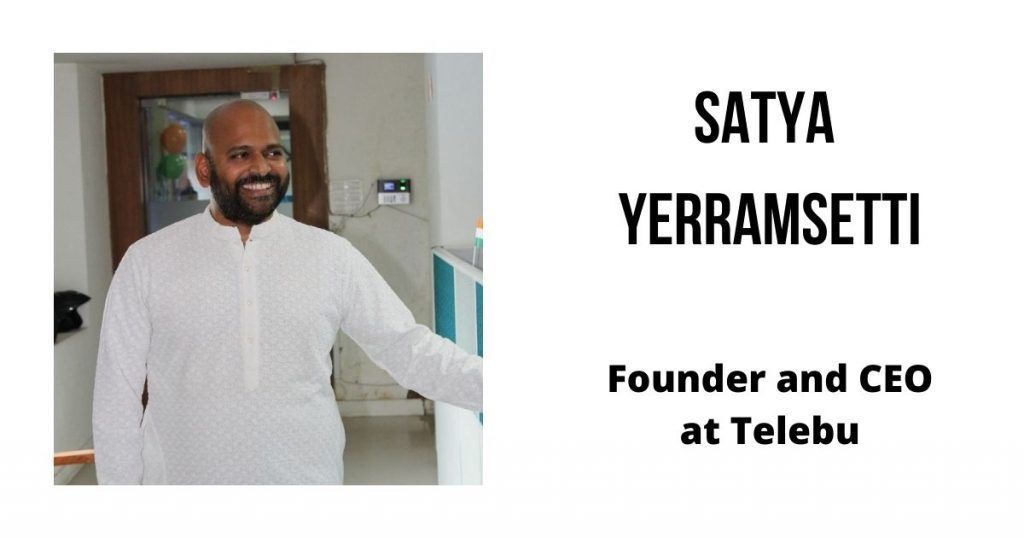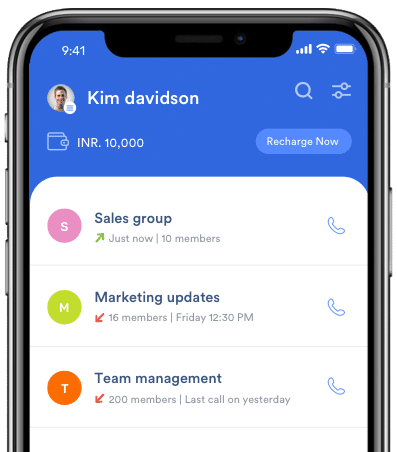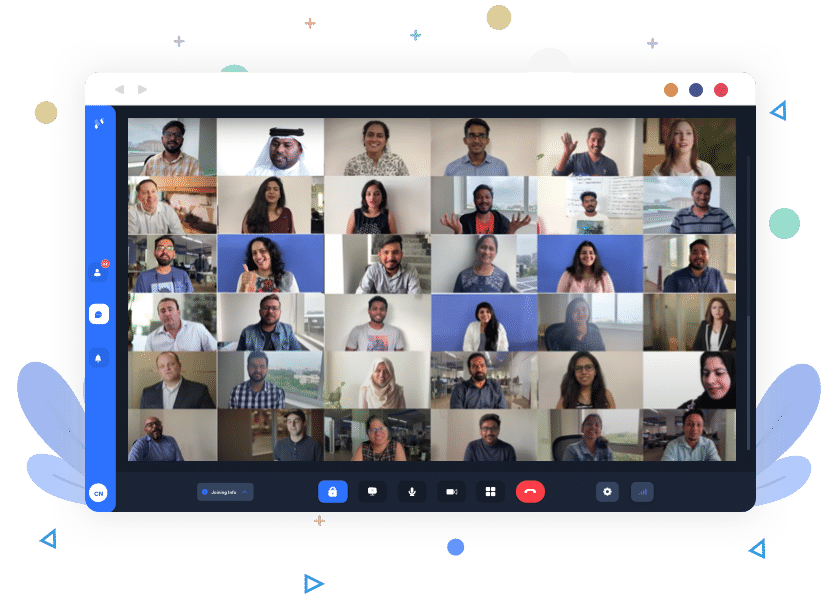UCaaS or unified communications as a service has been picking up steam, especially as the world has transitioned towards working from home. As the name suggests, UCaaS allows enterprises to utilize communications hosted on a cloud rather than having their own infrastructure. Such Cloud Communication Platforms let enterprises scale their needs as well. We recently managed to talk to the founder of Telebu, one of the leading players in the space. What’s more interesting is the fact that the company started with a free SMS service dubbed 160by2. We discuss the company’s inception, evolution, and future with its founder and CEO, Satya Yerramsetti.
PS: The interview has been edited for the sake of brevity.

Table of Contents
1) From a consumer-centric company with 160by2 to becoming a B2B-focused organization, can you share your journey into the world of SaaS?
It was in 2003 when I came back from Australia with a degree and a dream to start an online business that would take India into the dot-com age. With this vision in mind and with the support of a 7-member team, SMSCountry Networks was born at a tiny office in Ameerpet. Our aim was to make bulk SMS the marketing tool for Indian enterprises.
Riding on this wave of success, we soon opened new branches across the country and in Dubai followed by the launch of 160by2.com which was an entirely new solution enabling display of ads in SMSes. Thereafter, we also began offering custom-built APIs and SDKs to our customers, enabling them to integrate SMS capabilities into their native applications.
After receiving a warm response from the customers, we began thinking of ways to make conference calls easy and after months of research and innovation, we at Telebu were successful in developing a unified system called the PBFTS (Public Broadcast Feedback & Telephony System) that allowed the users to send SMS, schedule voice broadcasts, and even initiate calls easily. This is when we came up with the idea of developing the dial-out conference calling method, where the server could trigger a call to all the conference participants simultaneously.
Furthermore, understanding the need for a call center setup that could be deployed quickly, we began working on our own cloud-hosted call center software that would unify all call center essentials and systems into a single-view software solution and with this TelebuHub came into existence.
Amidst the launch of our applications, we realized that the name SMSCountry was leading to some confusion about our capabilities. Hence, we decided to rebrand ourselves as Telebu borrowing from the words Telecommunication and Business. Since then, Telebu has been a one stop-shop for all enterprise communication needs with a bouquet of products including grptalk, TelebuHub, TelebuJoin, TelebuPing, TelebuPop, SMS, and TelebuBlocks.
2) Telebu has several apps and verticals, could you explain what unifies them together?
Today, we live in a world where customers like interacting with the brands on the platform of their choice and where they can get instant replies to their queries. With this thought in mind, we at Telebu are building one unified platform where enterprises can manage all internal / external communication from a single platform.
Each of our products – audio conferencing, video conferencing, chatbots, virtual cloud office, text messaging, and APIs are internally connected that allows the enterprises to streamline their communication. Organizations can also opt for individual products and integrate it to their communication ecosystem via APIs or they can opt for our Telebu 360 product suite with a single login access to experience Unified communication as a service at scale.
3) Grptalk is an interesting idea, but in the age of video conferencing and collaboration tools, could you tell us how businesses are using it?

One of the biggest challenges faced by organizations and institutions is with regards to communication. During the communication process, conveying data and information instantly with security, without data leaks and information being misused remain the primary concerns. Infrastructure, hardware costs, and connectivity further lead to a gap in the communication systems. Another huge gap that exists in the communication technology space is the possibility of leveraging technology to connect users at scale, not just one but a thousand users simultaneously.
Therefore, with grptalk, we enable communication without the internet, offer complete control of the call and connect users instantly at scale; making it a viable option for all communication needs.
4) In the video conferencing software space, TelebuJoin is up against some powerful software, so how does it stand out?
TelebuJoin has been built with an objective to make education accessible, and consistent in the simplest way possible using technology. During our course of the journey, we realized that education sector required transformation from ground levels. Despite various initiatives, there has been a limited progress in delivering consistent, quality, and accessible education to all. This led to the inception of Telebu Join.
TelebuJoin is a platform for educators and children where they can learn, interact, and grow.
It’s a video conferencing & webinar platform that is built in India, and is tailored to the complexities of the Indian ecosystem. It lets you meet and interact from anywhere, on the go.
TelebuJoin is being widely used by educational institutions, especially government schools and colleges located in remote places and are looking for a solution that is not overly dependent on infrastructure but provides mobility, is easy to use, does not need a high-end smartphone or an app, and requires zero learning.
5) What’s the current user base of SaaS offerings from Telebu? Which are your biggest markets?
Overall Telebu has a user base of more than 10,000+ paying businesses as our customers catering to various categories like Text Messaging, Audio Conferencing, Video Conferencing, Virtual Cloud Office, Chatbots, and our CPaaS offering, Telebu Blocks.
Our customers are spread across many geographies with Indian states including Telengana, Maharashtra, Assam, Bihar, Chhattisgarh, Goa, Himachal Pradesh, J&K, Tamil Nadu, Puducherry, West Bengal & Uttarakhand being the most prominent ones. Globally, Bahrain, Qatar, Saudi Arabia, Kuwait, Oman, Hongkong, Singapore, Malaysia, and Philippines are also some of our biggest markets.
6) How has the ongoing pandemic affected Telebu – both in terms of business and number of users?
The pandemic has definitely affected our business. Just like others, we weren’t prepared for it too. The biggest challenge was the shift to remote work overnight, and keeping the teams motivated, happy, aligned to the ever-changing economic landscape, surviving, and growing as an organization.

As a result of the pandemic, we did undergo certain challenges. However, with our strategic approach, innovation, technology, and teamwork; we were able to sail through the storm. We were rather amongst the fortunate few who were in the right sector. Luckily for us, we have seen unprecedented growth in revenues, leads, users, ticket size, and profitability even during the pandemic.
We have successfully added 3x more customers in the last 9 months in comparison to the numbers we recorded for the entire FY 2019-20.
7) Could you share with us what next from Telebu? New software or updates to the existing products?
We will be coming up with a ton of new features and a couple of new products as well in the coming year. Our primary focus will be on developing:
1. Conferencing platforms that are smarter
2. Virtual Cloud Office
3. Bots – That can do more than just chat
4. Ecosystem – for Developers & SMEs via APIs + SDKs
5. 360-degree communication platform for businesses
Moreover, Telebu as an organization constantly strives towards establishing a perfect Product-Market Fit. To achieve the same goal, we will continue to iterate our existing products – add Security features, A2A calling facilities, Social Integrations, Scale, Speech to Text, Regional Language Operability, Location Tracking, Blur Background, Present Mode, Event Features, Moderation Rules, Filters, etc to our Audio Conferencing, Video Conferencing, Business Collaboration, and Contact Center Management platforms.
With this, we are also looking at tapping newer segments and markets including Sri Lanka, Bangladesh, Cambodia, Vietnam, Philippines, Thailand, Malaysia, and Indonesia to name a few.
8) What are your favorite SaaS products out there?
Drift, Chargebee, Sinch, Zoho, Hubspot, Shopify, Atlassian, Twilio, Square, Salesforce, Service Now, and Okta are some of my favorite SaaS products.






